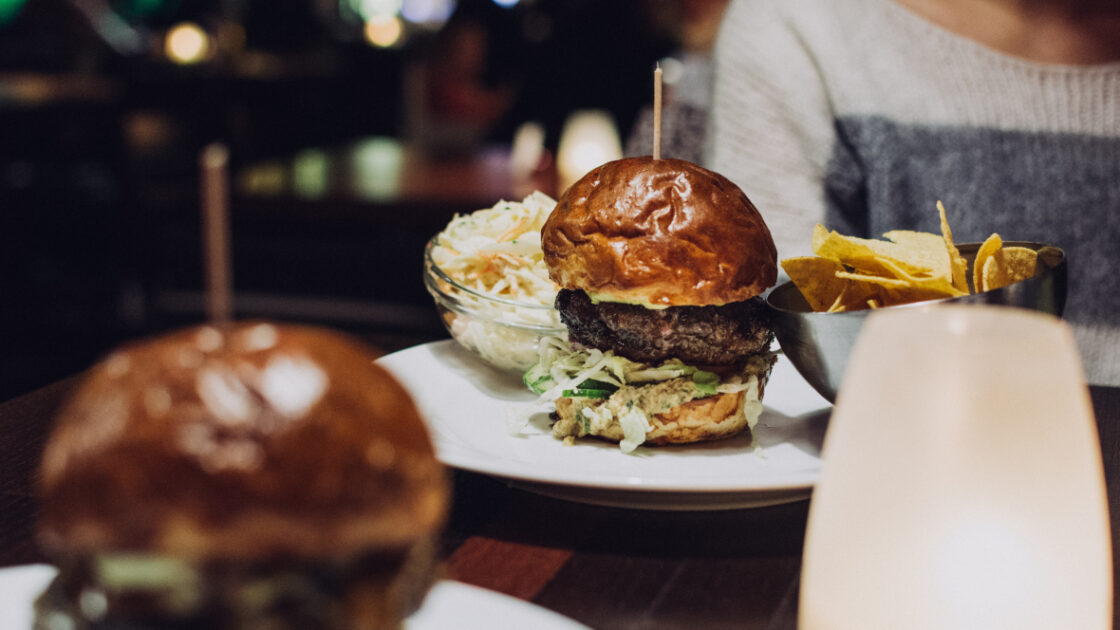Burger Buzzkill: Cattlemen’s Association Pushes for Exclusivity on ‘Meat’ and ‘Beef’

There’s little mistaking a burger for anything other than a burger. It’s big, juicy, and oh-so meaty. It’s sandwiched between a fluffy, often seed-topped, bun. Layered with toppings, sauces, cheeses. There are really no rules to burgering beyond the inclusion of the burger and the bun. From the traditional hamburger to buffalo burgers, salmon burgers, black bean burgers, mushroom burgers, and even the humble hippy staple lentil burger. But the U.S. Cattlemen’s Association, which represents the nation’s leading livestock producers, is aiming to take the fun out of America’s favorite sandwich (if you consider a burger a sandwich, that is).
In a petition filed earlier this month, the group noted that the words “beef” and “meat” should only be used to show consumers “that the product is derived naturally from animals as opposed to alternative proteins such as plants and insects or artificially grown in a laboratory,” the document explained.
The move comes as the beef industry is facing increasing competition from the growing plant-based and vegan meat sector. Companies like Beyond Meat have earned praise from meat producers — and financial support. Tyson Foods, the largest U.S. producer of chicken, pork, and beef, has invested two rounds of funding into Beyond Meat. Tyson also recently made an investment in Memphis Meats, a Bay Area cellular agriculture startup producing lab-grown clean meat from animal cells.
Late last year, Nestlé, the world’s largest food manufacturer, bought Sweet Earth Foods, a manufacturer of plant-based meats and frozen meals.
Then, there’s Impossible Foods, another Bay Area vegan meat startup that’s raised significant funds from investors including Bill Gates. Its current facility can produce one million pounds of plant-based burgers per month.
If all this hemming and hawing over language on products seems familiar, that’s because you’re probably thinking of similar efforts put forth by the dairy industry’s Dairy Pride Act last year, says Michele Simon, JD, MPH, and Executive Director of the Plant Based Foods Association.
“Looks like a similar desperate act by an industry that also cannot accept shifting consumer habits,” she told Organic Authority via email.
The Dairy Pride Act aimed at suppressing the use of words like “milk”, “cheese”, “yogurt” or “ice cream” on any products that did not originate from a cow.
Sales of nondairy milk have been skyrocketing in the last decade while milk sales are at their lowest in 30 years. Consumer tastes are indeed shifting as Simon notes with almond milk, coconut milk, and scores of other options from pea protein and flax milk to macadamia, peanut, and even banana milk all taking market share away from dairy sales.
Vegan meat producers, particularly those replicating the look, taste, and performance of meat, like Beyond Meat and Impossible Foods, are targeting meat eaters for a reason. Beyond Meat intentionally has its burgers merchandised adjacent to supermarket meat counters. Consumers, particularly Millennials and Gen Z shoppers, are much more open-minded about their food choices these days. They’re looking at flexitarian diets, those inspired by folks like New England Patriots quarterback Tom Brady where plants dominate the plate and meat is becoming less frequent. They’re interested in a range of protein options just like they are a range of milk options. Dairy drinkers may prefer almond milk creamer in their coffee or like a coconut milk smoothie instead of cow’s milk. And omnivores may still want their bacon, but on a Beyond Burger instead.
And beyond that, Jessica Almy policy director at the Good Food Institute, a leading nonprofit supporting the plant-based and clean meat industries ascents, says the Cattlemen’s Association petition is simply an attempt to police the competition and not at all in the best interest of consumers.
“It seems like they’re trying to meddle in the free market.”
And if there’s one thing today’s consumers don’t like, it’s being told what words they can or can’t use to describe their food. Because even if labels change, a burger will always be a burger, whether it comes from cows, peas, or beans, or cells scraped off a cow’s ear. The only real question consumers can’t seem to answer is whether or not a burger is a sandwich. (It totally is.)
Find Jill on Twitter and Instagram
Related on Organic Authority
Vegans are Taking Over the Trillion-Dollar Meat Industry (Yes, Real Meat)
Beyond Meat Ready to ‘Break the Code’ On Vegan Meat
Vegan Meat is Now the Biggest Trend in the Tech Industry

